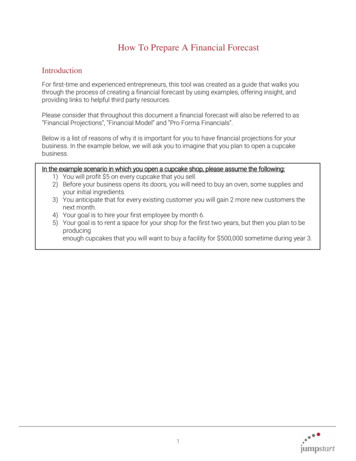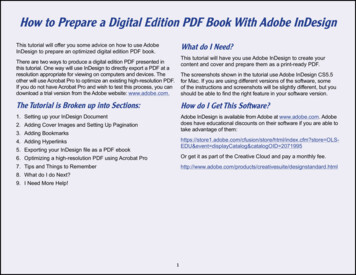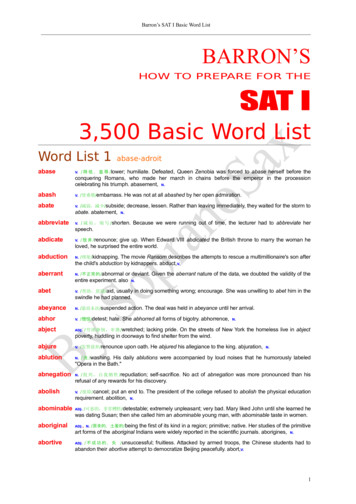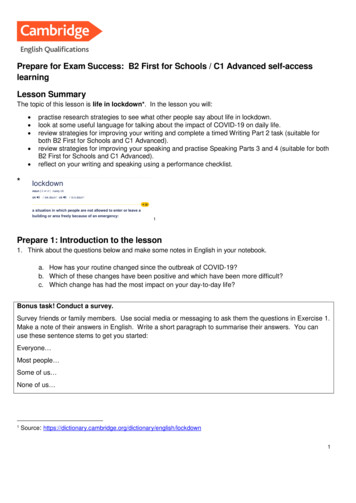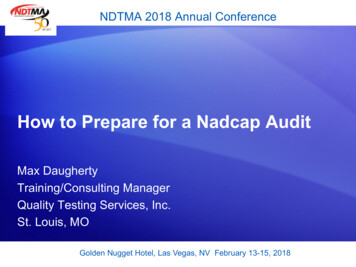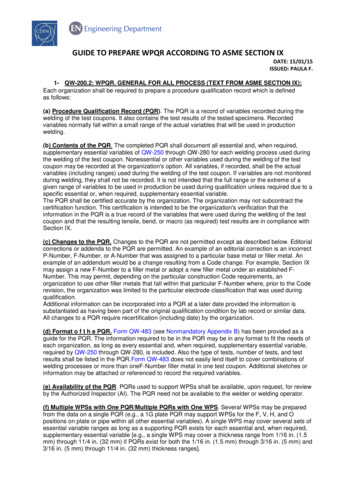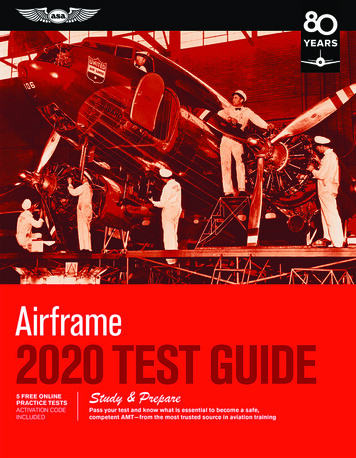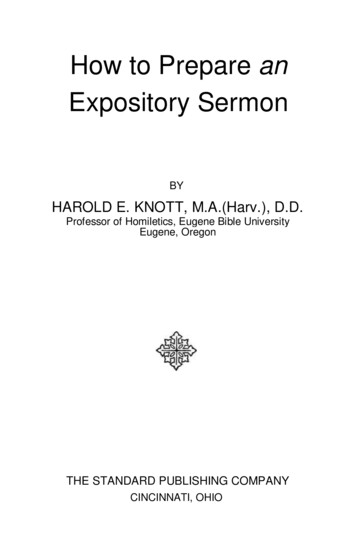
Transcription
How to Prepare anExpository SermonBYHAROLD E. KNOTT, M.A.(Harv.), D.D.Professor of Homiletics, Eugene Bible UniversityEugene, OregonTHE STANDARD PUBLISHING COMPANYCINCINNATI, OHIO
Copyrighted, 1930The Standard Publishing Company
To the students of my class in expository preaching, through whosehelp and co-operation many ofthe principles here given wereworked out and tested, thishook is affectionately dedicated.
Sympathetically undertaken, the studyof the Bible becomes an absorbing passion which will find its perfect satisfaction only when "we see no longerthrough a glass darkly, but face to face."The glory of expository preaching isthat it awakens an enthusiasm for theWord, and stirs men to that personalexploration of the inspired messagewhich will be worth more to them spiritually than all the sermons they willhear.NICHOLS.
CONTENTSPAGEPREFACE. 9CHAPTER I.THE VALUE OF EXPOSITORY PREACHING . 111. Definition of an expository sermon.2. Views of authorities on the subject.3. Value of the expository method:(a)To preacher.(b) To hearer.4. Objection to expository sermons:(a) Impression that expository sermons are dry.(b) Misunderstanding of expository sermons.(c) Idea that the Bible is not modern.(d) Difficulty of preparation.CHAPTER II.THE SERMON OUTLINE . 231. Essential parts to a sermon outline.(a) Discussion of various models.(b) Illustration of type followed in book.2. Difference between expository outline and other typesof sermons.(a) Expository sermons usually use more Scripture asa basis.(b) The expository method aims to develop thesermon from the Scripture.3. Phases of the expository outline needing specialattention.(a) Securing contact with audience.(b) Making a vital application.CHAPTER III.THE SCRIPTURE . 311. Variation, by the expository method, in the use ofScripture.5
Contents2. Expository method applied to the whole book of Bible.3. Expository method applied to chapter or similar logicaldivision.4. Expository method applied to short passage.5. Comparison of uses of Scripture of G. CampbellMorgan and Dr. Maclaren.CHAPTER IV.THE THEME. 411. Value of intensive study of the Bible as an aid todiscovering themes for exposition.2. Study of author's purpose and character as reflectedin any book, necessary to appreciate themespresented.3. Illustration of method of discovering themes forexposition.4. Personal qualities that help in finding themes forexpository preaching:(a) Trained mind.(b) Spiritual personality,(c) Close contact with life.CHAPTER V.THE INTRODUCTION . 511. Significance of "introduction."2. Procedure in preparing an introduction.(a) Explanation.(b) Introduction.(c) Proposition.3. Method illustrated by themes previously suggested.CHAPTER VI.THE MAIN DIVISIONS . 621. General purpose of divisions.2. Need for studying material before forming divisions inexpository sermons.3. Procedure in making divisions for an expositorysermon.(a) Summary method.(b) Related ideas.(c) Verbal method.4. Principles involved in good sermon divisions.6
Contents(a) Simple.(b) Progressive.(c) Complete proposition.5. Principles applied to themes already suggested.CHAPTER VII.THE DEVELOPMENT . 751. General principles involved in the development ofdivisions.2. The application of general principles to thedevelopment of expository sermons.(a) Intensive study.(b) Application.(c) Illustration.3. Development of divisions previously suggested.CHAPTER VIII.CONCLUSION .931. Purpose of conclusion.2. General principles of effective conclusion.3. Application of principles to expository sermon.CHAPTER IX.QUALITIES REQUISITE FOR SUCCESS AS AN EXPOSITOR . 981. Good education.2. Bible training.3. Studious habits.4. Oratorical ability.CHAPTER X.THE INFLUENCE OF THE EXPOSITORY METHOD ON THE VOICEIN DELIVERY OF SERMONS . 1031. It gives soul to one's message.2. It gives variety to vocal expression.CHAPTER XI.SERMONS ILLUSTRATING THE DIFFERENT USE OF SCRIPTURE.1. Sermon built upon a whole book.2. Sermon built upon part of a book.3. Sermon built upon one verse.7
ContentsCHAPTER XII.SERMONS ILLUSTRATING THE DIFFERENT METHODS OF DEVELOPMENT .1241. Sermon illustrating the summary method.2. Sermon illustrating the method of related ideas.3. Sermon illustrating the verbal method.
PREFACETHREE facts have impressed themselves uponthe author during the fifteen years that hehas been teaching homiletics to young men preparing for the ministry.The first of these is that writers on the subject of preaching are unanimous in regard tothe value of expository preaching. All agreethat it is the most effective form of pulpit eloquence.The next thing that has been forced upon hisattention is that while there is this unanimityof opinion, very few of our modern preachersare using this method. The reason for this condition would seem to be either a lack of knowledge of the value of expository sermons, or alack of ability in preparing them.In trying to account for this strange anomaly,the author became impressed with the furtherfact that there are practically no books published which place in the hands of preachers themeans for developing efficiency along this line.So unfortunate a lack in our religious literature is the cause of the present volume, and,while it may not accomplish all that the author9
Prefacewould like, he hopes that it may at least provesuggestive to some and help to focus attentionupon an important and neglected field in theological study. H. E. Knott.10
CHAPTER I.THE VALUE OF EXPOSITORY PREACHINGTHE expository sermon is an effort to explain,illustrate and apply the Scriptures to life;or, to use F. B. Meyer's words, "expositorypreaching is the consecutive treatment of somebook or extended portion of Scripture on whichthe preacher has concentrated head and heart,brain and brawn, over which he has thought andwept and prayed, until it has yielded up itsinner secret, and the spirit of it has passed intohis spirit."Its purpose is to help the hearers to find inthe sacred writings the true interpretation oflife. This is both a high ideal and a most delightful task, kindling in the soul of the preacherthat spark of heavenly fire which glows with enthusiasm and conviction.Every great preacher, as well as every writeron the subject of homiletics, regards expositorypreaching as the method par excellence. ThusPhelps, in his "Theory of Preaching," says: "Byparting with expository preaching, the pulpit hasparted with its most important aid and stimulusto variety. No other one thing gives to preach11
How to Prepare an Expository Sermoning so wide a range of religious thought as theexposition of the Scriptures when it comes forthas the fruit of a rich, full mind—rich in scholarlyresources, and full of intense, practical aims."Dean Brown, of Yale Divinity School, in the"Art of Preaching," declares his preference forthis method in the following terms: "lama firmbeliever in the value of expository preaching."Among other reasons for this attitude he affirmsthat "it has the historic warrant of being apostolic." It "ensures a more thorough knowledgeof the Bible on the part of the preacher himself.""This method of preaching," he says, "also develops a more thorough knowledge of the Bibleon the part of the people." "The expositoryform of preaching gradually develops both inthe pulpit and pew the Scriptural point of view,than which there is none better."Professor Smyth, of the University of Dublin,in "The Preacher and His Sermon," says: "Ourteaching would be much more systematic if wehad more expository preaching. It is a greatneed. People do not learn the Bible, they do notlearn how full of interest a book of the Bible iswhen rightly understood."Other writers on the subject are just as clearand emphatic.The habit of preaching expository sermonsis a splendid discipline for the preacher. It giveshim a more profound and vital interest in the12
The Value of Expository Preachingstudy of the Bible. It encourages him to searchthere for sermon material rather than in thenewspaper or in the works of science and philosophy. The notion that the Bible is not asinteresting or as fruitful in sermonic material asthese other fields, is a gigantic mistake. The onlyreason that people think the Bible is uninteresting is because they do not know it. F. B. Meyerhas probably not overemphasized it when he saysthat the real knowledge of the Bible is less thanthat of the standard works of fiction or poetry.The expository method also leads to a newmethod of studying the Scriptures. The purposechanges from that of seeking the bases of sermons in individual texts to that of finding themeaning of a book or chapter.This new approach to the Bible also givesbreadth to one's thinking, and both keeps thepreacher a student, and at the same time keepshis thinking in harmony with divine truth. Theone thing a preacher ought to know is his Bible,and this not only in the sense of an accumulationof texts, but also in the revelation of variousstatements to the context. The more one knowsthe Bible and endeavors to live it out in his ownlife the better man he will be and the larger willbe his ultimate influence on his people and community.The church is suffering to-day from the ministrations of two types of men in the pulpit—those13
How to Prepare an Expository Sermonwho are too broad and those who are too narrow.The former are well informed about the Bible,but are not informed in it, or have lost theirbearings and are trying to reach the popularmind by lecturettes on passing events, talkingglibly about the relation of science to religion,the need of the modern mind and similar subjects. The other group is made up of thosewhose preaching is thoroughly orthodox and sincere, but who have poorly furnished minds, andwho have only a vague knowledge of the Bibleas a whole. The sermons of this group naturallylack depth of thought, and, beyond the speakers'sincere expressions of faith and hope, are ineffective because they fail to relate Biblical truth topersonal experience. If the broad men were tobase their messages on the contents of the Scriptures, and the latter type knew the Bible better,both would undoubtedly be more interesting, andmore helpful to their hearers.One of the dangers to which any preacher isliable to fall a prey is "harping on the samestring." He may be influenced in his preaching byhis temperamental background—most, if not all,men are, to some extent—and thus may preachalong special lines of temperament, training orexperience. If one is studiously inclined, he islikely to display in his pulpit work an interestin some particular field; if one is mystically inclined, he is likely to spend much of his time in14
The Value of Expository Preachingthe clouds; and if one is afflicted with some physical ailment or having financial difficulties, hismessages are likely to be somber and gloomy.People love variety. The Lord did not make theflowers all of one kind, neither did He ordainthat the fruit should be all the same in shape,size, color or taste. All the dangers of temperament, training and experience may in some measure be offset, however, when by the expositorymethod we make the experience fit the truths ofScripture rather than use the Scripture to illustrate our own experience, as is likely to bethe case in the topical method of preaching.Not only, however, will the expository methodcontrol the preacher's religious outlook, but italso eliminates the waste of time and loss ofnervous energy absorbed in solving the problem,"What shall I preach about next Sunday?"Brown gives it as his experience, after spendingone or two hours daily in the intensive studyof individual books of the Bible, that after thefirst four months of his ministry he never spenta quarter of an hour hunting for a text or atheme. "Whether every expository preacher is asfortunate may be doubtful, but all will endorsehis views regarding the wonderful homileticalvalue of studying with the expository method inmind. "No other study," the same writer declares, "is so prolific of the finest quality andvariety of homiletic materials as the study of the15
How to Prepare an Expository SermonScriptures. No other materials work into therealities of human life and the emergencies ofmen's souls so deftly as the materials thusgained. Once full of them, and with a mindassimilated to their quality, with a speech thatholds them at the tongue's end, a preacher neednever exhaust himself. He need never rack hisbrain, or roam the streets for something to sayand something to the point. The stream is perennial. It is the river of the water of life." We arenot surprised, either, to hear him testifying to thehomiletical value of this method, or, what is stillmore vital, an uplifting of the mind "into a Biblical atmosphere, especially an atmosphere offaith in God and in this world's future."To solve the problem of next Sunday's sermon, one must have a field for the cultivationof new themes, and beyond all question the mostfertile, as well as the most desirable, is the Bible.The seed must germinate there, or we are failing .in our purpose to apply the truth of divine revelation to the experience of man. Not only, however, do the Scriptures supply the seed thought,but they also aid in its development. The topicalmethod, for example, requires one to develophis proposition from outside sources, while theexpository seeks this end by intensive study
1. Definition of an expository sermon. 2. Views of authorities on the subject. 3. Value of the expository method: (a)To preacher. (b) To hearer. 4. Objection to expository sermons: (a) Impression that expository sermons are dry. (b) Misunderstanding of expository sermons. (c) Idea that the Bible is not modern. (d) Difficulty of preparation. CHAPTER II.

